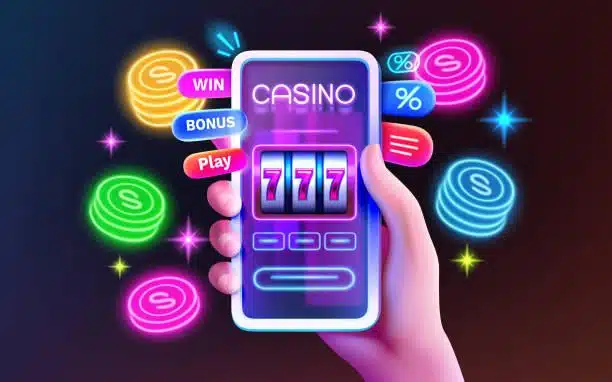In the digital age, the intersection of gaming and gambling is becoming increasingly blurred, especially in the realm of online slots. This article explores the fine line between gaming and gambling, focusing on the elements that differentiate and at times, combine the two. We’ll delve into the mechanics, psychological allure, regulatory landscape, and ethical considerations of online slots, providing a comprehensive overview for enthusiasts and casual observers alike.
What are Online Slots?
Online slots are virtual versions of the traditional slot machines seen in casinos. Instead of pulling a mechanical lever, players click a button on their screen. These games vary in themes, structures, and complexity, including classic three-reel games and more intricate multi-reel and multi-payline slots. The core premise remains the same: players wager money, spin the reels, and hope that when they stop spinning, they form a winning combination of symbols.
Understanding the Basics: Gaming vs. Gambling
Gaming generally refers to playing electronic games, primarily for entertainment, and not necessarily involving any wagering. It’s seen as an interactive form of entertainment based on skill, strategy, or luck, typically without monetary stakes.
Gambling, however, involves betting money or something of monetary value on an event with an uncertain outcome with the primary intent of winning additional money and/or material goods. Thus, gambling is a subset of gaming that involves significant risk as financial stakes are involved.
Online Slots: Where Gaming Meets Gambling
Online slots sit at the crossroads of gaming and gambling. They are designed like video games (gaming) and offer immersive graphics, intricate themes, and interactive features. However, they require players to bet money with the chance of winning or losing it, which places them firmly in gambling territory.
The Psychological Draw
Online slots are engineered to captivate players. Here’s how:
- Visual Appeal: Rich graphics and animations closely resemble those found in video games, attracting gamers.
- Instant Gratification: The quick play-to-outcome cycle of slots satisfies the need for immediate rewards.
- Escapism: They provide a retreat from reality, offering entertainment and excitement.
- Simplicity: Easy to play without prior knowledge or skills, appealing to a broad audience.
- Variable Rewards: Slots utilize a reward system that is unpredictable, which can be highly addictive. This system is known as a variable ratio reinforcement schedule, famously used in experiments by B.F. Skinner in the 1930s.
Regulatory Aspects
The regulation of online slots is complex and varies significantly from one jurisdiction to another. Generally, legitimate online casinos must obtain licenses from regulatory bodies such as the UK Gambling Commission, the Malta Gaming Authority, or the New Jersey Division of Gaming Enforcement. These organizations ensure that:
- Games are fair and operate correctly.
- Players are protected from predatory practices.
- Casinos adhere to legal and ethical standards.
Ethical and Legal Challenges
The convergence of gaming and gambling in online slots presents multiple ethical and legal challenges:
- Underage Gambling: Ensuring that minors do not gamble is a significant concern.
- Problem Gambling: Online slots can be addictive, and operators are required to offer tools to help manage or prevent addiction.
- Transparency: Players must be able to understand their odds of winning, and these must be clearly stated.
Economic Impact
The economic implications of online slots are profound. They generate substantial revenue for operators and provide taxes to governments. However, they also pose risks, such as encouraging problem gambling, which can have severe social costs.
Contribution to Technology and Innovation
Online slots drive technological innovation in several ways:
- Software Development: They push the envelope in software development, requiring advanced programming for random number generators, game design, and graphics.
- Mobile Technology: They promote advancements in mobile gaming technology, as many players prefer accessing games through their smartphones.
Social Dimensions
Online slots, like all forms of gambling, have social impacts. While they provide entertainment and can contribute economically, they also risk increasing gambling addiction. Responsible gambling practices are crucial and increasingly enforced by regulatory bodies to mitigate these risks.
Promoting Responsible Gambling
Operators offer various tools to promote responsible gambling, such as:
- Deposit Limits: Players can set limits on the amount they deposit over a specific period.
- Time Alerts: Notifications to remind players how long they have been playing.
- Self-exclusion Programs: Options for players to exclude themselves from playing for a period.
Conclusion
The line between gaming and gambling is indeed thin when it comes to online slots. They encapsulate elements of both, with the entertainment and sophistication of video games and the thrill and risks of gambling. As technology advances and regulatory frameworks evolve, the industry must balance innovation with consumer protection.
Understanding the nuances between gaming and gambling can help players make informed choices and enjoy online slots responsibly, keeping in mind the financial implications and the risk of addiction. As this field continues to grow, staying informed and vigilant about the practices of online slots will benefit all stakeholders—from players to regulators and industry operators.


